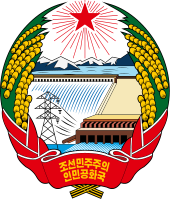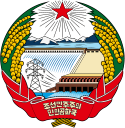- Supreme People's Assembly
-
Supreme People's Assembly
최고인민회의
最高人民會議
Choego Inmin Hoe-ui
Type Type Unicameral Leadership President of the Presidium Kim Yong-nam, Workers' Party
since 5 September 1998Members 687 Political groups Workers' Party (601)
Korean Social Democratic (51)
Chondoist Chongu (21)
Independents (Non-partisans) (13)Elections Last election 8 March 2009
General Election 2009Meeting place Supreme People's Assembly, Pyongyang Chosŏn'gŭl 최고인민회의 Hancha 最高人民會議 McCune–Reischauer Ch’oego Inmin Hoeŭi Revised Romanization Choego Inmin Hoeui North Korea 
This article is part of the series:
Politics and government of
North Korea
- Eternal President
- Supreme Leader
- Supreme People's Assembly
- Chairman of the Presidium
- National Defence Commission
- Chairman
- First Vice Chairman
- vacant
- Government
The Supreme People's Assembly (SPA) is the unicameral parliament of the Democratic People's Republic of Korea (DPRK), commonly known as North Korea. It consists of one deputy from each of 687 constituencies, elected to five-year terms.
North Korea is a single-party state; all candidates for the Supreme People's Assembly are picked by the Democratic Front for the Reunification of the Fatherland under Kim Jong-il. The body in turn is dominated by the Workers' Party of Korea.
Although the Supreme People's Assembly is North Korea's primary legislative body, it ordinarily delegates authority to the smaller and more powerful Presidium, chosen from among its members.
Contents
Elections and membership
Main article: Elections in North KoreaUnder the Constitution of North Korea, all citizens 17 and older, regardless of party affiliation, political views, or religion, are eligible to be elected to the parliament and vote in elections. In reality, however, North Korea is a totalitarian single-party state.
All candidates are selected by the Democratic Front for the Reunification of the Fatherland in mass meetings held to decide which candidates will be nominated and their names can only go on the ballot paper with the approval of the meeting. The Democratic Front for the Reunification of the Fatherland is a popular front dominated by the Korean Worker's Party, in which almost all power rests. The other participants in the coalition include the two other de facto legal political parties, the Korean Social Democratic Party and the Chondoist Chongu Party, as well as various other member organizations including social groups and youth groups, such as the Korean section of the Pioneer movement, the Kim Il Sung Socialist Youth League, the Korean Democratic Women's League, and the Red Cross Society of the Democratic People's Republic of Korea.
Elections are ostensibly by secret ballot. However, only one candidate who has been selected by the Democratic Front for the Reunification of the Fatherland appears on the ballot. A voter may cross off the candidate's name to vote against him, but must do so in a special booth without any secrecy. According to many North Korean defectors, such an act of defiance is too risky to even attempt.[1]
History
In 1990 the composition of the SPA was 601 seats held by the Workers' Party of Korea, 51 seats held by the Korean Social Democratic Party, 22 seats held by the Chondoist Chongu Party and 13 seats held by independents.[2]
Kim Jong Il did not make a speech at the first session of the 10th SPA in 1998. Instead, members listened to a tape-recorded speech of the late Kim Il Sung, which was made at the first session of the 9th SPA, in 1991.
The enhanced status of the Korean People's Army was anticipated by the SPA election July 1998, when 101 military officials were elected out of 687 delegates. This was a big jump from the 57 military officials elected during the 9th SPA in 1990.
Kim Yong-nam has been president of the Assembly Presidum and de facto head of state of North Korea since 1998. Choe Thae-bok is the Chairman of the SPA, and Kim Wan-su and Hong Son Ok are the Vice-Chairmen.[3]
Functions
According to the Constitution of North Korea, it is the highest organ of state power. In practice, it merely serves as a rubber stamp for decisions already made by the nation's executive organs and the Workers' Party. The SPA always passes all proposals by the government into law during its sessions with almost no debate or modification.
The Assembly is convened once or twice a year in regular sessions of several days each. At all other times, the Presidium serves as the country’s legislature. Extraordinary sessions of the Assembly can also meet when called by the Presidium or by one third of the Assembly deputies.
The functions of the SPA are:[4]
- Adopting, amending or supplementing enactments to the constitution
- Determining State policy and budgets
- Elections of the Chairman, Vice-Chairman and members of the National Defence Commission
- Election of the President and other members of the Presidium
- Elections of legal officials
- Appointing President, Vice-President and other members of the Cabinet
- Receiving reports and adopting measures on the Cabinet
The Constitution is amended when approved by more than two thirds of the number of deputies.[4]
Presidium
The Presidium of the Supreme People's Assembly is the highest organ of power in North Korea. It exercises legislative power when the SPA is in recess, which occurs during all but a few days of every year. Kim Yong-nam is the current President of the Presidium.[3]
The Presidium consists of the President, Vice-Presidents, secretaries and other members. The functions of the Presidium are to:[4]
- Convene sessions of the Supreme People's Assembly
- Examining and approving new State legislation when the SPA is in recess
- Interpretation and enactment of the Constitution and legislation
- Forming or dissolving State ministries
- Supervise laws of State organs
- Organisation of elections to the Supreme People's Assembly
- Ratification of treaties with foreign countries
- Appointment, transferring or removal of officials and judges when the SPA is not in session
- Granting special pardons or amnesties
In addition to its executive functions, the Presidium also receives credentials of diplomatic representatives from foreign countries.[4]
According to the 1998 Constitution, the Presidium and the President of the Presidium succeed the Assembly's Standing Committee and the Chairman of the Standing Committee; the latter post was both the speaker of the Assembly and the head of State before the creation of the President of the DPRK. Currently, the President of the Presidium is the head of State, while the Chairman of the Assembly is the SPA speaker.
References
- ^ "North Korea votes for new rubber-stamp parliament," Associated Press, March 8, 2009.
- ^ Association of Secretaries General of Parliaments
- ^ a b Dae-woong, Jin (2007-10-04). "Who's who in North Korea's power elite". The Korea Herald. http://www.koreaherald.co.kr:8080/servlet/cms.article.view?tpl=print&sname=National&img=/img/pic/ico_nat_pic.gif&id=200710040041. Retrieved 2007-10-05.
- ^ a b c d Europa Publications Staff. (2002). The Far East and Australasia 2003. Routledge. pp. 680. ISBN 978-1-85743-133-9
External links
- North Korean Government, CIA World Factbook
- FACTBOX - North Korea's main political bodies and power, Reuters.
- First Session of 12th Supreme People's Assembly of North Korea Held[dead link]
Parliamentary elections Local elections 2007 · 2011Kim Tu-bong (1948-1957) • Choi Yong-kun (1957-1972) • Hwang Jang-yop (1972-1983) • Yang Hyong-sop (1983-1998) • Kim Yong-nam (Since 1998)
Parliament of Asia Sovereign
states- Afghanistan
- Armenia
- Azerbaijan
- Bahrain
- Bangladesh
- Bhutan
- Brunei
- Burma (Myanmar)
- Cambodia
- People's Republic of China
- Cyprus
- East Timor (Timor-Leste)
- Egypt
- Georgia
- India
- Indonesia
- Iran
- Iraq
- Israel
- Japan
- Jordan
- Kazakhstan
- North Korea
- South Korea
- Kuwait
- Kyrgyzstan
- Laos
- Lebanon
- Malaysia
- Maldives
- Mongolia
- Nepal
- Oman
- Pakistan
- Philippines
- Qatar
- Russia
- Saudi Arabia
- Singapore
- Sri Lanka
- Syria
- Tajikistan
- Thailand
- Turkey
- Turkmenistan
- United Arab Emirates
- Uzbekistan
- Vietnam
- Yemen
States with limited
recognition- Abkhazia
- Nagorno-Karabakh
- Northern Cyprus
- Palestine
- Republic of China (Taiwan)
- South Ossetia
Dependencies and
other territories- Christmas Island
- Cocos (Keeling) Islands
- Hong Kong
- Macau
Coordinates: 39°01′43″N 125°44′59″E / 39.02861°N 125.74972°E
Categories:- Parliaments by country
- Government of North Korea
- Unicameral legislatures
- Supreme People's Assembly
Wikimedia Foundation. 2010.
